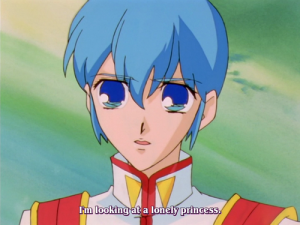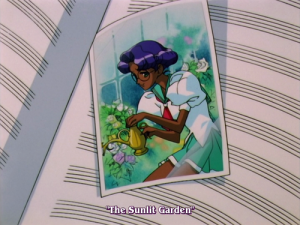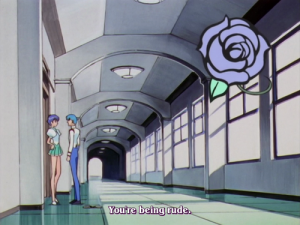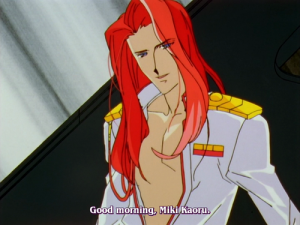The Four Horsemen of the Patriarchy: Part 3 Miki
The Virgin/Whore Complex
By Caitlin Moore
For more Fujoshi Feminism Articles, click here
Ah, Miki. Poor sweet, stupid Miki.

Miki, the secretary of the Student Council, is in seventh grade and the youngest member by far. He is also the most “normal” (as far as that goes in this series) and likable of the student council, and throughout the show usually treats Utena and Anthy with dignity and respect. He is highly intelligent and sometimes serves as the innocent, virginal foil to his compatriots. But innocence can lead to black and white thinking and one being easily manipulated, as is the case with Miki and his virgin/whore complex.
Miki is an accomplished pianist, frequently found playing the piano in the music room. He takes credit for the famous piece The Sunlit Garden, claiming he and his twin sister composed it as children. He frequently reflects on these fond childhood memories, but there is an edge of bitterness to it – when pressed, he claims that he “smashed it with his own hand.” The anger he has toward himself is unfounded, as it is revealed he became ill just before they were supposed to perform. Forced to go on solo, his sister fled the stage and never touched the piano again. It’s a sad story of talent destroyed too young.
That’s what we’re led to believe. But in Revolutionary Girl Utena, things are never as they seem, and more pieces of the puzzle fall into place when we meet his sister Kozue. She bumps into Miki as she emerges from the piano room, knocking the sheet music from his hands. He treats her icily, completely different from the kind, warm boy we’ve known so far. “I gave up on you long ago,” he tells her, but she doesn’t seem perturbed. She wasn’t in the piano room for the piano, she tells him. Her rumpled clothes and Touga leaning against the piano, his shirt open, tell Miki everything he needs to know. Miki is horrified.
A cigar is never just a cigar in Utena, nor is a piano ever just a piano. The shining thing Miki seeks is his relationship with his sister, clearly, but it was not spoiled by their botched concert. If that were the case, he wouldn’t have treated her with such naked contempt. The piano and their song is just a symbol for what Miki believed they had. ”No matter how much I polished my technique, I could never match the feeling of my sister’s playing,” he says. They complemented and completed each other. But, at some point in their past, she changed. Instead of playing piano with her brother, she spent her time pursuing boys and sex. In Miki’s eyes, she is fallen. Society at large takes a similar view to girls and women who actively enjoy casual sex – Kozue certainly is not in a loving, committed relationship with Touga – condemning them as sluts and whores. Female sexuality is deviant, threatening, and worthy of condemnation.
Anthy, on the other hand, is the Rose Bride, and the Rose Bride is whoever you want her to be. Upon hearing her piano playing, Miki immediately begins projecting his longing for the relationship he once had with Kozue onto her. At first, per Utena’s suggestion, he recommends the Student Council cease their dueling and dissolve, freeing the Rose Bride. “No matter how great this power is that we’re supposed to get, I can’t support a system that robs Anthy Himemiya of her personal freedom!” A noble, selfless sentiment, and one that not a single member of the council honestly believes.
The ever-manipulative Touga recognizes this, and convinces Miki that Utena will rob him of this shining thing. Miki has come to believe that Anthy must be protected…and by “Anthy”, I mean “Anthy’s purity”. She is the virgin of his virgin/whore complex, never mind that she has been engaged to less high-minded individuals. “If you don’t protect the things precious to you, people will take them away from you,” Touga says, prompting Miki to ask Anthy if she’d stop playing if Utena told her to. Of course she would, since she is the Rose Bride and must do as her fiancée says. It doesn’t matter that Utena never actually would demand that Anthy stop playing piano – the fact that she has the capacity to take that away is enough to convince Miki to try to win Anthy in a duel.
 When Miki is thinking of Utena as a potential threat, of course, it’s not actually about Anthy playing the piano, but about Utena as a sexual threat. In Miki’s eyes, Utena could sully Anthy, defile her, rob her of that purity that he finds so desirable. Anthy’s own desires in this situation are irrelevant, and Miki, who once desired to restore Anthy’s lost agency, returns to seeking to control Anthy and her decisions about her body.
When Miki is thinking of Utena as a potential threat, of course, it’s not actually about Anthy playing the piano, but about Utena as a sexual threat. In Miki’s eyes, Utena could sully Anthy, defile her, rob her of that purity that he finds so desirable. Anthy’s own desires in this situation are irrelevant, and Miki, who once desired to restore Anthy’s lost agency, returns to seeking to control Anthy and her decisions about her body.
How common is it, in society, for men to try control women’s decisions regarding their own bodies, to try to preserve virginity and purity that does not exist? In America, we have father-daughter purity balls, abstinence-only education, and purity rings. Young women are taught that if they have sex, nobody else will want them, although no such restrictions exist for young men. In Japan, innocence is even further commodified, asidol singers aren’t allowed to have boyfriends so as not to destroy the fetishized version of innocence they sell their fans, and transgressions can be career-destroying. Miki is no better than those who would try to control young women’s bodies, throwing aside his high-minded ideals at the idea of Anthy not living up to an arbitrary standard.
As is the case with all the duels in Utena, Miki’s sexism is the source of his downfall. He is a skilled fencer and very nearly defeats Utena. However, when Anthy begins cheering for Utena to win, he is momentarily shocked, giving Utena the opening she needs to cut the rose from his chest. He is startled at the realization that Anthy doesn’t need his protection, and that she may be happy with the person he has come to view as a threat. This is what culture needs to realize about women – that women do not need protection from their own sexuality, and to fight their honor is a useless endeavor.
The final piece of the puzzle falls in place at the end of his second episode. Kozue, with some friends, is playing the piano…terribly. Her friends express shock that she ever played, and Kozue reveals that Miki always covered for her. “Even with my sloppy playing, he could still follow it,” she explains. But there is no emotion in it to make up for the lack of technique. It was all Miki. Kozue was never who he believed she was. He merely projected upon her who he wanted her to be, and condemned her when she couldn’t live up to it.
Follow fujoshifeminism.tumblr.com for more content and discussions. Agent Artemis also accepts suggestions, recommendations, and submissions through her tumblr.


